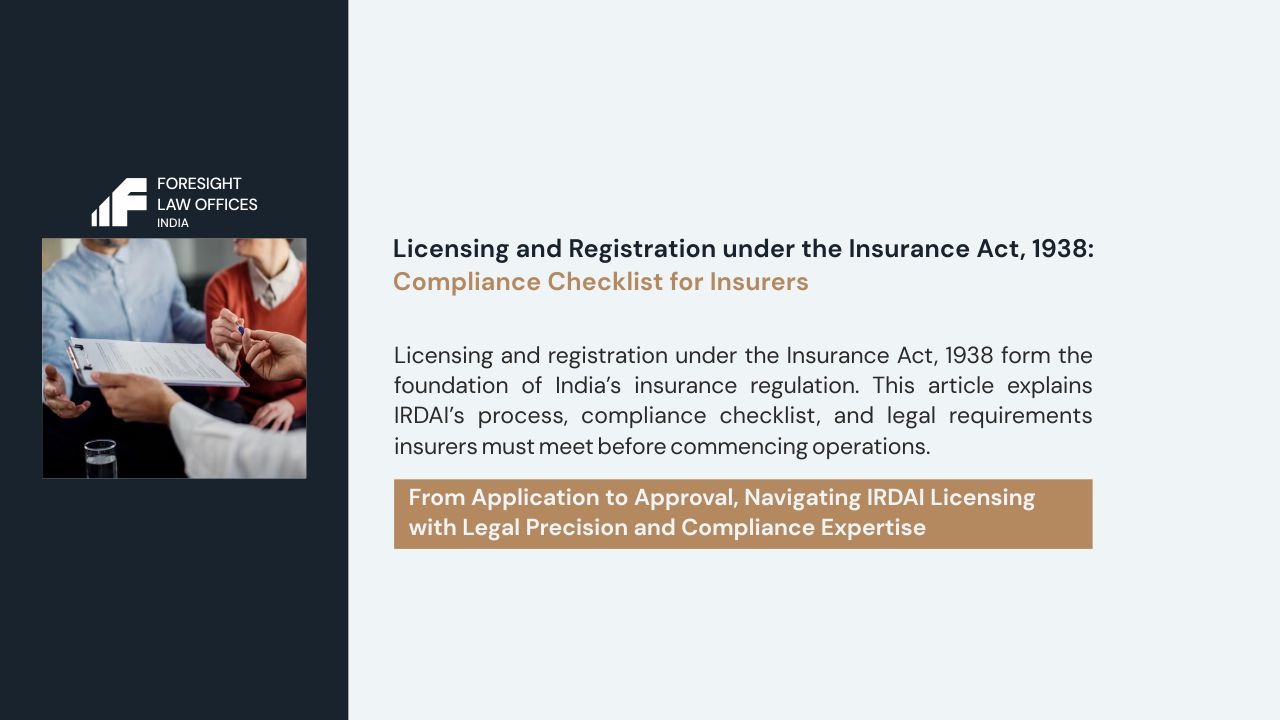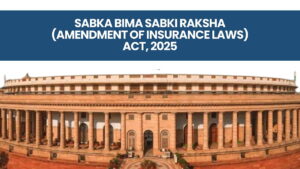In India, no business in the insurance sector can operate without the explicit authorization of the Insurance Regulatory and Development Authority of India (IRDAI). This requirement stems from the Insurance Act, 1938, which establishes the foundation for the licensing and registration of insurers.
The Act ensures that only financially sound, ethically managed, and legally compliant entities enter the insurance business: protecting policyholders and promoting market stability.
For companies venturing into life, general, health, or reinsurance segments, understanding the licensing and registration compliance framework is critical. Navigating this process requires the expertise of insurance regulatory compliance lawyers, who ensure that every statutory step aligns with IRDAI norms, financial obligations, and corporate governance standards.
The Legal Foundation: The Insurance Act, 1938 and the IRDAI Act, 1999
The Insurance Act, 1938 is India’s oldest and most comprehensive legislation governing the insurance business. It was enacted to regulate the conduct, financial prudence, and transparency of insurers.
Post-liberalisation, the Insurance Regulatory and Development Authority Act, 1999 introduced the IRDAI, which now administers and enforces the provisions of the 1938 Act. Together, these statutes ensure that every insurer — domestic or foreign — undergoes rigorous scrutiny before commencing operations in India.
Under Section 3 of the Insurance Act, 1938, no person or company can carry on insurance business in India unless it holds a certificate of registration issued by the IRDAI. This provision covers:
- Life insurance
- General insurance (including fire, marine, and miscellaneous)
- Health insurance
- Reinsurance
Categories of Insurers: Who Needs Registration?
The licensing requirement applies to:
- Indian insurance companies (incorporated under the Companies Act)
- Reinsurers (domestic and foreign branches)
- Foreign companies seeking to operate through Indian branches under IRDAI approval
- Insurance intermediaries such as brokers, web aggregators, and third-party administrators (through separate licenses)
Each category is subject to specific registration norms, capital thresholds, and foreign ownership limits. For instance, under the FEMA (Non-Debt Instruments) Rules, 2019, foreign investment in insurance companies is capped at 74%, with certain board composition requirements.
Pre-Licensing Requirements: Eligibility and Capital Norms
Before applying for registration, insurers must satisfy the following eligibility conditions under Section 2C and Section 6A of the Insurance Act:
- Form of Company: Must be a public limited company registered under the Companies Act, 2013 (except for cooperative societies).
- Capital Requirements: Life or General Insurer: Minimum ₹100 crore paid-up equity capital
- Reinsurer: Minimum ₹200 crore paid-up equity capital
- Promoter and Shareholder Fit & Proper Criteria: IRDAI assesses the reputation, financial soundness, and integrity of the promoters and directors.
- Indian Ownership and Control: Even with foreign investment, control must remain with resident Indian citizens or entities.
Engaging insurance regulatory compliance lawyers during this stage ensures that corporate structuring, shareholding, and documentation meet IRDAI’s detailed scrutiny standards.
Application for Registration: Two-Stage Process
The licensing procedure under IRDAI (Registration of Indian Insurance Companies) Regulations, 2022 follows a structured two-stage process:
Stage 1: R1 Application – Principal Approval
- Applicant submits Form IRDAI/R1 with:
- Detailed business plan (five years)
- Shareholding pattern and sources of capital
- Director and promoter profiles
- Draft Memorandum & Articles of Association (MOA/AOA)
- Evidence of capital deposit and infrastructure readiness
- The IRDAI reviews the proposal and may grant R1 (in-principle approval) if satisfied with financial strength and management capability.
Stage 2: R2 Application – Certificate of Registration
- Within six months of R1 approval, the applicant files Form IRDAI/R2 with proof of:
- Capital infusion
- Infrastructure and IT systems
- Compliance with statutory deposit requirements (Section 7 of the Act)
- Reinsurance arrangements and risk management policies
- Upon satisfaction, the IRDAI issues a Certificate of Registration, allowing the insurer to commence operations.
Missing documentation, inadequate capital proof, or discrepancies in promoter information can lead to rejection — making early legal review essential.
Key IRDAI Compliance Checks for New Insurers
The IRDAI’s registration checklist extends beyond documentation. It examines business viability, governance, and ethical conduct.
A few essential compliance points include:
- Fit and Proper Certification for promoters, directors, and key managerial personnel.
- Solvency Margin Compliance: Maintaining at least 150% solvency ratio post-licensing.
- Infrastructure Readiness: Offices, IT systems, and grievance redressal mechanisms in place.
- Reinsurance Strategy Approval: Proper risk transfer arrangements vetted under IRDAI’s reinsurance regulations.
- Product Filing Process: Prior approval or use-and-file mechanisms for insurance products under IRDAI (Product Filing) Guidelines.
Legal teams offering insurance policy drafting legal services ensure that policy wordings comply with IRDAI product and disclosure norms — avoiding future consumer or regulatory disputes.
Post-Licensing Obligations: Maintaining Registration
Registration is not a one-time event; it is an ongoing compliance responsibility. Under Section 3A of the Insurance Act and subsequent IRDAI regulations, insurers must:
- Renew registration annually before 31st December.
- Submit audited financial statements and solvency certificates.
- Comply with investment regulations under Section 27 of the Act.
- Disclose management changes and corporate governance reports.
- Maintain statutory deposits with the Reserve Bank of India (RBI).
Failure to comply can result in suspension or cancellation of registration under Section 3B of the Act.
To prevent such lapses, insurers often retain insurance regulatory compliance lawyers for periodic audits, board training, and legal certification of IRDAI filings.
Reinsurance Licensing and Oversight
For reinsurers, the IRDAI’s Reinsurance Regulations, 2018 establish specific obligations:
- Foreign Reinsurance Branches (FRBs) must obtain separate IRDAI approval.
- Priority of placement with Indian reinsurers (notably GIC Re) must be respected.
- Adequate retention ratios and risk diversification are required.
Given the cross-border nature of reinsurance contracts, reinsurance contract legal services are crucial. These services help insurers draft contracts that balance IRDAI requirements with international reinsurance standards and dispute resolution norms.
Digital Distribution and Insurtech Licensing
With the rise of digital insurance platforms, IRDAI has introduced guidelines for:
- Web Aggregators (2020 Regulations)
- Insurance Marketing Firms
- Point-of-Sale Persons (PoSP)
- Insurtech Sandbox Entities
These frameworks aim to encourage innovation while ensuring compliance with data privacy, cybersecurity, and ethical distribution practices.
For emerging digital players, insurtech legal compliance services help interpret complex licensing norms — from aggregator approvals to DPDP Act compliance in handling customer data.
Common Legal Challenges During Licensing
Many applicants face hurdles during the registration process due to:
- Ambiguous ownership structures or foreign control concerns
- Deficiencies in the “fit and proper” disclosures
- Delays in product filing or actuarial approvals
- Non-compliance with solvency or deposit requirements
- Lack of alignment between MOA objects and insurance business scope
Engaging an experienced insurance claim dispute law firm or regulatory counsel early can mitigate these risks by ensuring that documentation, filings, and representations meet IRDAI’s rigorous standards.
Enforcement and Penalties for Non-Compliance
Under the Insurance Act, non-compliance with licensing or renewal provisions can invite severe penalties:
- Fines up to ₹1 crore for operating without valid registration (Section 102).
- Suspension or cancellation of license under Section 3B.
- Disqualification of directors or officers involved in the violation.
- Prosecution under Section 105C for willful misstatements or concealment.
In such cases, legal representation by a specialised insurance regulatory compliance law firm becomes critical to protect business continuity and negotiate settlements or remedial action plans with the IRDAI.
Conclusion: Compliance as the Foundation of Trust
Licensing and registration under the Insurance Act, 1938 are more than procedural formalities, they embody the regulator’s trust in an insurer’s integrity, solvency, and consumer commitment.
In a market that now welcomes insurtech startups, cross-border reinsurers, and hybrid distribution models, the IRDAI’s licensing framework ensures that innovation does not compromise regulation.
For insurers, aligning business objectives with statutory requirements is not optional, it’s strategic.
Collaborating with professionals such as insurance regulatory compliance lawyers, insurance policy drafting legal experts, and reinsurance contract legal advisors helps companies maintain that balance, ensuring lawful operation, brand credibility, and long-term sustainability in India’s growing insurance ecosystem.






